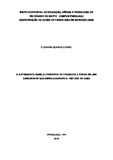O artesanato como alternativa de trabalho e renda em uma Comunidade Quilombola/Agrovila - estudo de caso
Resumo
The artisanal activity is a source of income for a large number of
Brazilian families, whether in large centers or in the most distant places, showing a
great deal of force in the generation of jobs. At the same time, handicrafts offer greater
visibility to the cultural production of marginalized social groups, such as quilombola
remnants communities, feeding potentially transformative discussions about their
conditions and secondary position in public policies and laws aimed at the craft itself,
as well as in the organizations. Given this scenario, this work was developed in the
quilombola community Picada, located in the municipality of Ipanguaçu / RN, where
the Renascer dos Artesãos da Carnauba Association is located. Our object of study
is the artisans, who work in the production of traditional crafts, in which the main raw
material for the manufacture of the handmade pieces is the straw extracted from the
carnauba. In order to collect the information, visits and interviews were made with
some of the members, with the purpose of analyzing the crafts as an alternative work
and income in the life of these craftsmen, and to know what were the significant
changes that occur from the moment they began to manufacture and sell these
handmade pieces. Impact assessment in the community after social technology
adherence.




